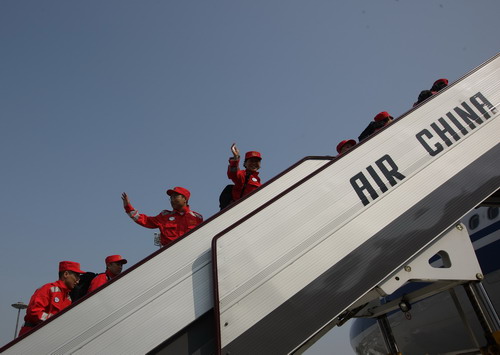China
More medical rescuers head to Pakistan
By Ai Yang (China Daily)
Updated: 2010-09-15 07:56
 |
Large Medium Small |
|
 The second batch of Chinese medical team consisting of 64 members depart for Pakistan on Tuesday in Beijing. Xing Guangli / Xinhua |
Beijing - China has dispatched a second emergency medical team comprised of 59 doctors and paramedics to flood-ravaged Pakistan on Tuesday morning.
"Because of the devastation, millions of people have moved into relief camps or spontaneous settlements," Masood Khan, Pakistan's ambassador to China said at the airport in Beijing before seeing off the Chinese team.
"The biggest dangers in these camps", he added, "are disease and epidemics."
China's previous 55-member search and rescue team, sent on Aug 26, has so far treated nearly 10,000 flood-affected patients, according to the ambassador.
"The team has seen as many as 700 patients a day," Khan said in an expression of deep gratitude for China's help.
Taking into account the nature of Pakistan's culture and its population demographics, the number of female doctors and paramedics has also been increased to 25 this time around, up from 12.
This medical team will partially relieve the first unit sent to Pakistan three weeks ago.
The recent floods are Pakistan's worst-ever natural disaster in terms of damage - with more than six million people being forced from their homes, and an overall 20 million people affected.
So far, the flooding has claimed the lives of more than 2,000 people, and aid agencies have warned that millions more remain at risk if emergency food and shelter are not provided immediately.
According to the Pakistani embassy in Beijing, new donations are continuously pouring in from China, with the most recent funds coming from educational institutions including universities, schools - and even kindergartens.
China had previously given 120 million yuan ($17.6 million) in aid to Pakistan, but last week it announced that another 200 million yuan ($29.4 million) of humanitarian assistance is on the way.
Chinese Ambassador to Pakistan Liu Jian visited a mobile hospital last week set up by a Chinese search-and-rescue team in south Pakistan's Thatta region, one of the hardest-hit parts of the country.
Liu said that Chinese helicopters would take part in Pakistan's relief operations, according to Xinhua.
Meanwhile, the international community is also pursuing ways to help Pakistan cope with the disaster. EU member states, for example, are likely to offer trade-linked aid to the country, according to AFP.
During a two-day informal meeting of foreign ministers from the 27-nation bloc, EU foreign policy chief Catherine Ashton suggested special exemptions from trade tariffs. Britain and Germany, on the other hand, have expressed a willingness to help with "strategic interests" in mind.
Many EU nations are also said to favor a waiver to allow a limited list of Pakistani goods to ease into the EU.
But the list of product areas qualifying for exemptions - aimed at providing some 25 million euros ($32.3 million) of annual benefits to Pakistan - was drawn up with likely objections in mind, and Europe has also been criticized by humanitarian organizations for struggling to produce a coherent, collective position on helping Pakistan, the AFP said.
According to Pakistan's English-language daily newspaper, Dawn, the UN's initial $460 million appeal will be augmented this week. But UN figures show that donors have met only about two-thirds of the initial appeal, launched on Aug 11.
Pakistan's ambassador to the United States, Husain Haqqani, said that while Washington has been generous, ordinary Americans can do more.
Thanking the US for the its generosity, Haqqani added that: "One thing where the US has not yet reached its full potential is private giving."
The Pakistani government estimates losses at $43 billion and says the gross domestic product could be around 2.5 percent, from the original target of 4.5 percent for the 2010-11 fiscal year.
Reuters contributed to this story.
China Daily